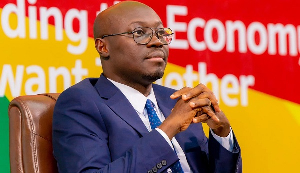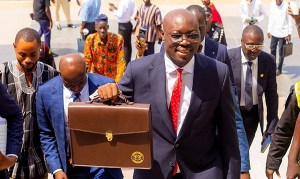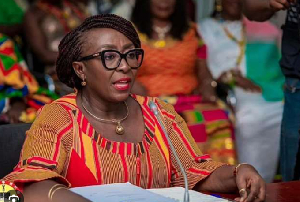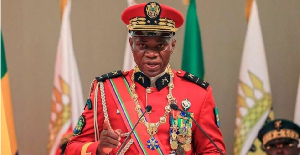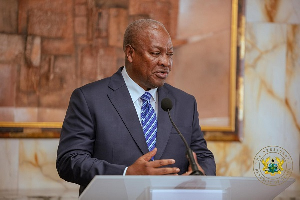The World Bank affirms alliance between the United States? 'Gateway to the South' and Ghana's 'Garden City'
Speech: Making Poverty Your Business
General News of Sunday, 17 December 2006
Source: worldbank.org
The Kumasi - Atlanta Partnership
The World Bank affirms alliance between the United States’ “Gateway to the South” and Ghana’s “Garden City”
December 15, 2006—Kumasi, the second largest city in Ghana, is known as the “Garden City,” a title all but forgotten as a result of a rapidly increasing population and strained service capacities in recent years. In an effort to help Kumasi meet the challenges that have stemmed from its development, the World Bank is supporting the creation of a unique partnership between seasoned development groups in the Atlanta, Georgia community, led by CARE, and the city of Kumasi.
This partnership was announced Dec. 11, at city hall in Atlanta, Georgia, by Mayor Shirley Franklin, CARE President Helene Gayle, World Bank President Paul Wolfowitz, Ambassador Andrew Young, and Georgia State University’s Assistant Provost for International Affairs, John Hicks.
The Kumasi - Atlanta Partnership is an innovative approach to encourage direct city-to-city development assistance and leverage both resources and knowledge effectively to build the capacity of Kumasi to attract foreign investment and trade, and to better provide services critical to meeting the needs of its growing population. Urban areas in developed countries have often been faced with challenges similar to those in developing countries – for example, transportation, health, education, security – and are able to provide useful and practical support based on their experiences. In addition, this relationship can and should provide significant opportunities for Kumasi to increase its ability to build a vibrant private sector.
“The Kumasi - Atlanta Partnership will fill an important role in helping Kumasi build its capacity to attract foreign investment and address the challenges of urban economic growth and poverty reduction,” said World Bank President Paul Wolfowitz, who spoke at the launch of the alliance.
With 36, 645 African-born residents, Atlanta has the fourth largest population of African diaspora living in the United States. It is also a city rich in African-American culture, history, and leadership. In addition, twenty-four of Georgia’s top trading partners are developing countries where the World Bank has lending programs, for an estimated $4.9 billion in trade with those countries last year. Atlanta is also home to a significant number of prominent institutions – from the academic, private, public and non-profit sectors - active in international trade and development.
Kumasi is a city with a population of 1.4 million (and growing), and is viewed as the commercial, cultural and transport center of Ghana. It is viewed as a nerve center for the region and the country. It is a vibrant blend of traditional culture, scholarship, modern commerce, and small scale trade. The city has a huge market and informal economy, including woodworking, light engineering, vehicle repair, footwear, and furniture making. Formal industries include timber, beer brewing, and food processing.
Despite this, growth has outstripped the capacity of its urban roads, and traffic congestion is a feature of Kumasi. Further, housing is becoming increasingly scarce and expensive. While 95% of city houses have electricity, only 65% are connected to water. There is growing concern about environmental degradation and deforestation in the urban center and surrounding region.
Kumasi makes an ideal partner city with Atlanta because of its strong connections with the city, and with the US government. In addition to CARE’s presence, numerous Atlanta-based organizations have activities, contacts and associations with Kumasi or Ghana in general. Atlanta was the site of Ghana ’s first trade and investment exposition in the U.S. in July 2004, as well as part of a broader Expo in Atlanta in October 2005. US cities like Atlanta have much to learn from the rich cultural roots and multifaceted urban challenges confronted by cities like Kumasi, and much to gain from development, health and commercial partnerships.
The World Bank will serve as a catalyst to encourage the formation of the creative, direct public-private partnership that should leverage development effectiveness for both cities. The Atlanta partners will work directly with their Kumasi counterparts to establish clear priorities for their initial work, setting the stage for a longer term relationship that both sides hope will continue for a decade or more. The Atlanta partners believe that they can provide $10 million or more to support this longer term program.
Atlanta Visit
While in Atlanta, Mr. Wolfowitz delivered the 19th Annual Eizenstat Memorial Lecture in which he highlighted the importance of the International Development Association, the world’s largest source of concessional loans and grant assistance to the poorest countries, and encouraged Americans to support development efforts, particularly in sub-Saharan Africa.
In the address he argued for increased U.S. development aid for Africa. “Today we cannot walk alone on the path to prosperity. We cannot afford to turn our backs on the pain and poverty that consume entire nations and communities,” Mr. Wolfowitz noted, adding that the number of Africans living in poverty has doubled in the last 20 years.
The speech, delivered at the Ahavath Achim synagogue, was attended by an audience of approximately 700 people and received two standing ovations.
Mr. Wolfowitz also visited the Carter Center, participated in a roundtable discussion with graduate students at the Andrew Young School for Policy Studies at Georgia State University, and delivered a speech to an audience of local business and civic leaders at the Atlanta Federal Reserve Bank.


